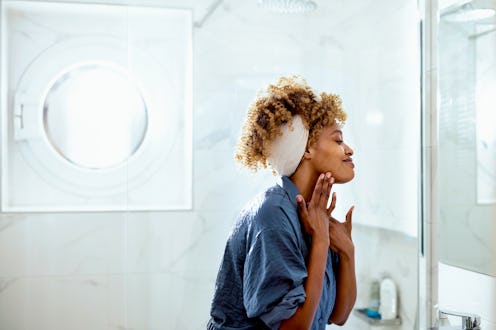Fashion
How To Choose The Best Moisturizer For Acneic Skin

While many of us with oily or acne-prone skin may have feared moisturizers at one point or another, they won't actually make your breakouts worse. That is, if you know which ones to use. Because while some moisturizers can actually improve breakouts, others may just exacerbate the problem. So to find out a little more about how your moisturizer could be affecting your breakouts, I emailed with Dr. Craig Kraffert, board-certified dermatologist and president of Amarte. He let me know that even though it is important to moisturize acne-prone skin to keep it healthy and even help reduce the amount of oil production, there are often so many different ingredients in moisturizers that it can be difficult to really know what will help and what will hurt.
Before looking to the ingredients themselves though, Dr. Kraffert explains that the ideal moisturizer consistency for acne-prone skin will depend on how oily your skin is. For skin that is not excessively oily, Dr. Kraffert recommends a moisturizing cream that has a high water content to keep skin balanced. As for skin that is very oily, he suggests a hydrating serum that will balance the skin without leaving behind that greasy feeling of a heavy cream. But simply using a product that is not too heavy or too light may not be enough to keep acne flare-ups under control. Here's what else you should look for in your ideal moisturizer:
1. Emollient Class
Amarte Aqua Veil Pure Hydration Serum, $57, Derm Store
According to Dr. Kraffert, one of the factors of comedogenicity, or "the tendency of moisturizers to form precursor acne lesions," as he explains it, is how emollient the moisturizer is. To help prevent clogged pores in acne-prone skin, Dr. Kraffert recommends looking for lighter moisturizers that are silicone-based rather than oil-based.
2. Acne-Improving Ingredients
Amarte Aqua Cream, $93, Derm Store
While there are moisturizers that contain ingredients that work well to improve breakouts, many of these products do not make acne claims on their packaging or labels, says Dr. Kraffert. Instead of only looking for claims and advertisements, Dr. Kraffert recommends reading the ingredients lists of products to see if something that may work for you is included. Two ingredients he suggests looking for are purified sulfur and retinol.
3. Inflammatory Ingredients
Peter Thomas Roth Glycolic Acid 10% Moisturizer, $45, Nordstrom
While other ingredients such as alpha and beta hydroxy acids (AHAs and BHAs, respectively), hydroquinone, and rejuvenating ingredients could also be helpful for some with acne-prone skin, they could cause inflammation or irregularities in pigmentation for others. Dr. Kraffert explains, "Acne is an inherently inflammatory condition to begin with, so any moisturizer that tends to cause even mild inflammation may cause worsening or flaring of acne." Because ingredients like these could help some and harm others, it is important to know what types of ingredients work best with your skin. Be sure to read the labels of all of your skincare, and keep track of how your skin reacts to new products to determine what works and what doesn't.
4. PIH-Calming Ingredients
Decleor Paris Hydra Floral Anti-Pollution Hydrating Gel-Cream, $70, Derm Store
Although acne itself can cause post-inflammatory hyperpigmentation (PIH), Dr. Kraffert notes that if moisturizers do not contain ingredients that help regulate pigmentary expression, they can make PIH worse if they contribute to inflammation. To help reduce acne-related PIH, he recommends moisturizers that have calming and anti-inflammatory properties and/or contain brightening compounds such as arbutin.
Moisturizer is necessary to keep any type of skin, even oily, acne-prone types healthy. But the right one will not only keep your skin properly hydrated, it could also help improve your breakouts.
Images: miniseries/E+/Getty Images; Courtesy of Brands